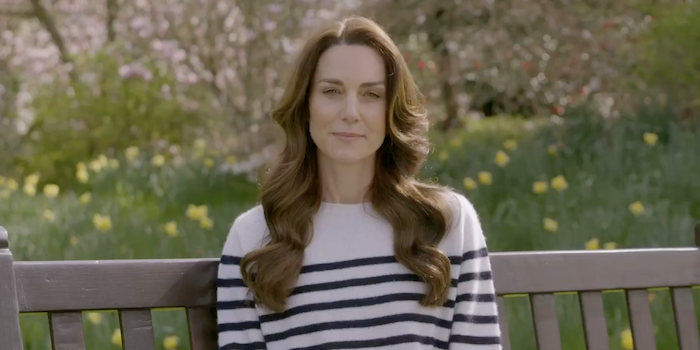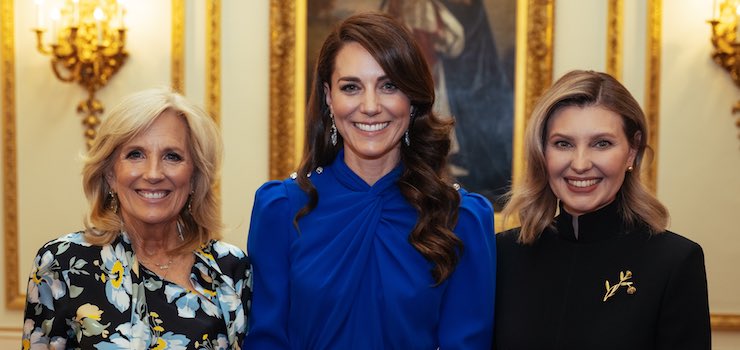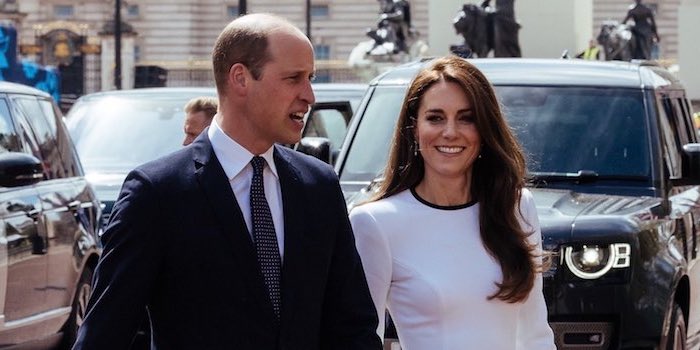Royals from all over Europe attended various events today, January 27, commemorating the 75th anniversary of the liberation of Auschwitz-Birkenau. Prince William and The Duchess of Cambridge attended a ceremony at Methodist Central Hall in London, while The Duchess of Cornwall and many other European royals attended a ceremony at Auschwitz-Birkenau in Poland.
Embed from Getty ImagesIn London, William and Kate attended the UK Holocaust Memorial Day Commemorative Ceremony at Methodist Central Hall where William gave a reading of an extract from a letter written by a friend of Princess Alice (the Duke of Edinburgh’s mother). Princess Alice hid a Jewish mother, Rachel Cohen, and her daughter at her home in Athens during the war. William said:
Embed from Getty Images“The princess put a small two-room apartment on the third floor at the disposal of Mrs Cohen and her daughter,” he read. “It was thanks to the courageous rescue of Princess Alice that the members of the Cohen family were saved.
“The members of the Cohen family left the residence three weeks after liberation, aware that by virtue of the princess’s generosity and bravery had spared them from the Nazis.”
He added that Evy Cohen, the great-granddaughter of Rachel, had said: “My family would not exist without the courageous act of Princess Alice. Her story of incredible courage must keep being told in her memory. My generation, the past generation and the future generation are and will eternally be grateful to his great-grandmother Princess Alice for the great act of bravery, risking her own life to take in a family in need.”
The Times
During the ceremony, William and Kate lit candles as part of a ceremony which saw 75 candles lit.
Embed from Getty ImagesAfterward, William and Kate met with Holocaust survivors who attended the ceremony. William is pictured here with Manfred Goldberg, 89, who was deported from Germany to the Riga Ghetto in Latvia before being transferred to Stutthof concentration camp in August 1944. A little more on Manfred:
Embed from Getty ImagesManfred was finally liberated at Neustadt in Germany on 3 May 1945. Manfred came to Britain in September 1946 to be reunited with his father. After learning English, he managed to catch up on some of his missed education and he eventually graduated from London University with a degree in Electronics. He is married with four sons and several grandchildren.
Holocaust Educational Trust
Kate is pictured with Yvonne Bernstein, 82, one of the two survivors Kate photographed for a project for the Holocaust Memorial Trust exhibition. Some more about Yvonne:
Embed from Getty ImagesYvonne was born in Germany in 1937, and named Ursula. Her father was in Amsterdam on business when Kristallnacht took place in 1938, and was advised to stay there and go into hiding. After months of hiding, he got a visa to go to the UK and work in the jewelry business in Birmingham.
Yvonne’s mother then managed to get a domestic visa to work for a vicar in Nottingham, but she could not bring Yvonne with her. They expected to be reunited a few weeks later, but war broke out. As a young child, Yvonne then undertook a long journey in the care of her aunt and uncle, frequently changing homes and names whilst living in France, including two months hiding in a convent with her cousin. Eventually the Nazis came to arrest the family.
Although Yvonne, her cousin and her aunt were released, her uncle was sent to Auschwitz where he was murdered. In 1944, Yvonne’s father, who was then in the British Army, set out to find his daughter and she eventually arrived in Britain at eight years old in June 1945. She was reunited with her parents.
Times of Israel
Fashion is definitely not the most important thing today, but a quick roundup of Kate’s outfit: a Catherine Walker coat she debuted in 2019, and her Cassandra Goad pearl earrings.
Kate is pictured here with Mala Tribich MBE, a Bergen-Belsen survivor who was born in Poland and spent time in hiding in Warsaw before eventually being sent to Ravensbrück concentration camp in November 1944. After ten weeks there, Mala was transferred to Bergen-Belsen where she contracted typhus. More on Mala’s life after Bergen-Belsen:
Embed from Getty ImagesAt the time of the liberation by the British army, Mala was very ill. She was transferred to a hospital/children’s home and it was many weeks before she recovered. Three months later she was sent, with a large group of children, to Sweden where she spent nearly two years. Not expecting any of her family to be alive, Mala was surprised to receive a letter from her brother Ben in England, the only other member of her close family to have survived.
In March 1947, Mala came to England to be reunited with Ben. She learnt English, attended secretarial college and within a year was working in an office. In 1949, she met Maurice, whom she married in 1950. Whilst her children were growing up, Mala studied and gained a degree in Sociology from the University of London. Today Mala has two children and three grandchildren. Mala’s testimony can also be found in the book The Boys by Sir Martin Gilbert.
Holocaust Educational Trust
The Duchess of Cornwall, King Willem-Alexander and Queen Maxima, King Philippe and Queen Mathilde, King Felipe and Queen Letizia, and Crown Princess Victoria joined over 200 Auschwitz survivors at the “Gate of Death” at Auschwitz-Birkenau at 3:30pm to commemorate the liberation by the Red Army at that time 75 years ago.
Embed from Getty ImagesPrince Charles was in Israel last week on an official visit which saw him visit the Israel Museum in Jerusalem and attend the World Holocaust Forum at Yad Vashem. Charles is Patron of the Holocaust Memorial Day Trust, and wrote the foreword to the National Commemorative Ceremony programme. He wrote:
Embed from Getty ImagesAs Patron, I would like to extend a warm welcome to you all to the National Commemorative Ceremony for Holocaust Memorial Day 2020. The commemoration of seventy-five years since the camp of Auschwitz-Birkenau was liberated is truly an occasion of national significance and I am heartened to hear of thousands of events taking place in all parts of the United Kingdom to mark this sombre, but significant anniversary. With the invaluable support of the Holocaust Memorial Day Trust, people of all ages and backgrounds are enabled to learn from the Holocaust and more recent genocides.
Today is also the beginning of a whole year of reflection, as it also marks the seventy-fifth anniversaries of the liberation of Bergen-Belsen and Dachau camps, as well as the commemorations, later in the year, of the end of the Second World War itself. In July we will mark the twenty-fifth anniversary of the genocidal massacre in Srebrenica, Bosnia. While all these occasions call us to remember, they must also call us to resolve that such unutterable evil shall never again be allowed to grow. As we stand at the milestone of seventy-five years since the end of the Holocaust, it is natural to reflect on how far we have come and what society might have learned since those dreadful events.
We can reflect that if we have found how devastating hatred can be, we have found that hope is stronger still. If we have seen the worst of human nature, we are the better prepared to guard against it. With such sobering knowledge comes great responsibility. Wherever we see malice that seeks to marginalise; wherever identity is subjected to hostility, we must, as this year’s theme reminds us, Stand Together to oppose it.
This seventy-fifth anniversary is therefore a time for us all to resolve to act with greater compassion, greater humanity and greater courage, so that, guided by lessons from this darkest time in our shared history, we can create a shared future where no such shadows can fall.
princeofwales.gov.uk
A report released in 2018 of a poll, conducted by Conference on Jewish Material Claims Against Germany, of American adults found that 66% of American millennials cannot identify whether Auschwitz was a concentration camp or an extermination camp, and 22% said they haven’t heard of the Holocaust or are not sure whether they’ve heard of it. A different recent survey suggested that 40% of Germans aged 18-34 either knew nothing or knew only a little about the mass murders.
A growing fear is that as we move farther away from the Holocaust, and as we lose more of the people who witnessed it first hand, the less respect people hold for the millions that died during it, the easier it is for people to deny that it existed, and the greater chance there is for us to repeat those mistakes.
Embed from Getty ImagesThe Times has quotes from several survivors who warned that if we’re not careful, that if we don’t learn from the mistakes of our past, that something as atrocious as the Holocaust could happen again.
At the ceremony in Poland today:
Jeanette Spiegel, 96, was 20 when she was brought to the concentration and extermination complex in German-occupied Poland and spent nine months there. Today she lives in New York and is fearful of rising violence and prejudice in the United States.
“I think they pick on the Jews because we are such a small minority and it is easy to pick on us,” she said, fighting back tears. “Young people should understand that nothing is for sure, that some terrible things can happen and they have to be very careful. And that, God forbid, what happened to the Jewish people then should never be repeated.”
David Marks, 91, who lost 35 relatives after they arrived at Auschwitz from their village in Romania, said: “We would like that the next generation know what we went through, and it should never happen again.
“A dictator doesn’t come up from one day to the other. . . It happens in “micro steps. If we don’t watch it, one day you wake up and it’s too late.”
The Times
At the World Holocaust Forum in Yad Vashem last week:
“The concept of ‘Never forget’ is more important today than ever,” [Rose Moskowitz, 94] said. “Racism, xenophobia and antisemitism are coming back stronger. Political parties are openly promoting nationalism and hatred. Even the governments and democratic institutions are doing little to stop it. This is the type of environment that allowed antisemitism to spread like wildfire.” […]
“Supporting institutions [like Yad Vashem] is critical,” said Mrs Moskowitz. “We must teach the younger generations how to pass on our story and sound the warning siren when symptoms of antisemitism, nationalism and divisiveness appear.”
The Times
In addition to the articles I’ve linked above, here are a couple more to read:
- Holocaust survivor, 90, reveals diary that tells of meeting Mengele in Auschwitz
- I will never forget Auschwitz, but you must remember us too
- Why we must revisit and relearn the horror of the Holocaust



